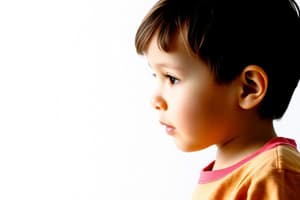Podcast
Questions and Answers
What stage of childhood development is characterized by rapid physical growth and the beginning of language acquisition?
What stage of childhood development is characterized by rapid physical growth and the beginning of language acquisition?
- Early Childhood
- Prenatal
- Adolescence
- Infancy (correct)
Which key area of development encompasses the understanding and expression of emotions?
Which key area of development encompasses the understanding and expression of emotions?
- Cognitive Development
- Language Development
- Social Development
- Emotional Development (correct)
During which stage do children primarily develop their fine and gross motor skills?
During which stage do children primarily develop their fine and gross motor skills?
- Middle Childhood
- Infancy
- Adolescence
- Early Childhood (correct)
What is a key factor that impacts a child's cognitive development?
What is a key factor that impacts a child's cognitive development?
Which theory focuses on the stages of cognitive growth in children?
Which theory focuses on the stages of cognitive growth in children?
What is a significant change that occurs during adolescence in terms of cognitive development?
What is a significant change that occurs during adolescence in terms of cognitive development?
Which of the following parenting styles is most likely to positively influence a child's emotional and social development?
Which of the following parenting styles is most likely to positively influence a child's emotional and social development?
What developmental milestone is typically achieved in middle childhood?
What developmental milestone is typically achieved in middle childhood?
Flashcards
Prenatal Stage
Prenatal Stage
The period from conception to birth, marked by rapid development influenced by maternal factors.
Infancy Stage
Infancy Stage
From birth to 2 years, characterized by growth, motor skill development, caregiver attachment, and initial language.
Early Childhood Stage
Early Childhood Stage
From 2 to 6 years, marked by motor skill refinement, language growth, symbolic thinking, and social interaction.
Middle Childhood Stage
Middle Childhood Stage
Signup and view all the flashcards
Adolescence Stage
Adolescence Stage
Signup and view all the flashcards
Physical Development
Physical Development
Signup and view all the flashcards
Cognitive Development
Cognitive Development
Signup and view all the flashcards
Emotional Development
Emotional Development
Signup and view all the flashcards
Study Notes
Stages of Childhood Development
-
Prenatal (Conception to Birth)
- Development of physical and neurological structures.
- Influenced by maternal health, nutrition, and environment.
-
Infancy (Birth to 2 years)
- Rapid physical growth and motor skills development.
- Attachment formation with caregivers.
- Development of basic sensory and perceptual abilities.
- Language acquisition begins with cooing and babbling.
-
Early Childhood (2 to 6 years)
- Development of fine and gross motor skills.
- Growth in language and communication skills.
- Cognitive development characterized by symbolic thinking.
- Social skills emerge through play and interaction.
-
Middle Childhood (6 to 12 years)
- Improvement in logical thinking and problem-solving.
- Development of self-concept and self-esteem.
- Peer relationships become significant.
- Academic skills develop; emphasis on reading and math.
-
Adolescence (12 to 18 years)
- Physical changes: puberty and sexual maturation.
- Identity formation and exploration of personal beliefs.
- Increased independence and peer influence.
- Cognitive development shifts to abstract and critical thinking.
Key Areas of Development
-
Physical Development
- Growth patterns (height, weight, muscle development).
- Motor skills (fine and gross motor coordination).
-
Cognitive Development
- Learning, memory, problem-solving abilities.
- Understanding of concepts (time, space, number).
-
Emotional Development
- Recognition and expression of emotions.
- Development of empathy and emotional regulation.
-
Social Development
- Forming relationships with peers and adults.
- Understanding social norms and roles.
-
Language Development
- Progression from babbling to complex sentence structure.
- Vocabulary expansion and comprehension skills.
Influencing Factors
-
Genetic Factors
- Inherited traits influence physical and cognitive development.
-
Environmental Factors
- Family dynamics, socio-economic status, and cultural background.
- Access to education and healthcare resources.
-
Parenting Styles
- Authoritative, authoritarian, permissive, and neglectful styles affect emotional and social development.
-
Social Interactions
- Impact of peers, schools, and community on social skills and self-esteem.
Theories of Childhood Development
-
Piaget's Cognitive Development Theory
- Stages of cognitive growth: Sensorimotor, Preoperational, Concrete Operational, Formal Operational.
-
Erikson's Psychosocial Development Theory
- Eight stages of development focusing on psychosocial conflicts (e.g., trust vs. mistrust, identity vs. role confusion).
-
Vygotsky's Sociocultural Theory
- Emphasis on social interaction and cultural context in cognitive development.
- Concept of the Zone of Proximal Development (ZPD).
Importance of Early Childhood Experiences
- Early experiences shape brain development and emotional health.
- Critical periods for language, attachment, and social skills.
- Role of early intervention in addressing developmental delays.
Stages of Childhood Development
- Prenatal Stage: Involves the formation of physical and neurological structures, impacted by maternal health, nutrition, and environmental factors.
- Infancy: Characterized by rapid growth, motor skills development, attachment to caregivers, and initial language acquisition through cooing and babbling.
- Early Childhood: Fine and gross motor skills develop, along with significant advancements in language, cognitive skills featuring symbolic thinking, and social skills through play.
- Middle Childhood: Logical thinking, problem-solving improves; self-concept and self-esteem develop; peer relationships gain importance, along with academic skill emphasis on reading and math.
- Adolescence: Marked by puberty, identity exploration, increased independence and peer influence, alongside a shift towards abstract and critical thinking.
Key Areas of Development
- Physical Development: Regression in height, weight, and muscle coordination; mastery of motor skills.
- Cognitive Development: Encompasses learning, memory, problem-solving; develops understanding of spatial, numerical, and temporal concepts.
- Emotional Development: Involves recognition of emotions, empathy, and self-regulation of feelings.
- Social Development: Emphasizes relationship building, understanding social norms, and roles within society.
- Language Development: Progresses from simple babbling to complex sentence structures; includes vocabulary growth and understanding.
Influencing Factors
- Genetic Factors: Inherited characteristics that shape physical attributes and cognitive abilities.
- Environmental Factors: Family dynamics, socio-economic status, cultural background, and access to education and healthcare significantly affect development.
- Parenting Styles: Variations (authoritative, authoritarian, permissive, neglectful) have distinct impacts on a child's emotional and social growth.
- Social Interactions: Relationships with peers, educational environments, and community influence social skills and self-esteem development.
Theories of Childhood Development
- Piaget's Cognitive Development Theory: Identifies stages (Sensorimotor, Preoperational, Concrete Operational, Formal Operational) of cognitive progression.
- Erikson's Psychosocial Development Theory: Consists of eight stages addressing psychosocial conflicts such as trust vs. mistrust and identity vs. role confusion.
- Vygotsky's Sociocultural Theory: Emphasizes the significance of social interaction and cultural context on cognitive growth, introducing the Zone of Proximal Development (ZPD).
Importance of Early Childhood Experiences
- Early experiences fundamentally shape brain development and emotional well-being.
- Critical developmental periods exist for language acquisition, attachment formation, and social skill development.
- Early intervention is crucial for addressing and mitigating developmental delays.
Studying That Suits You
Use AI to generate personalized quizzes and flashcards to suit your learning preferences.




